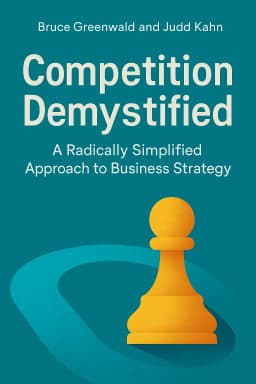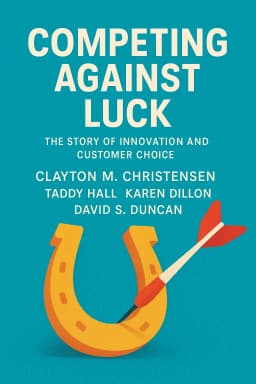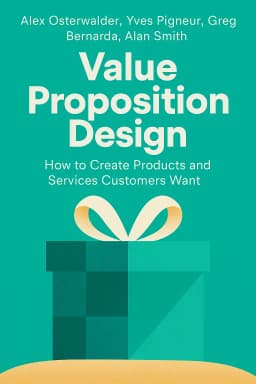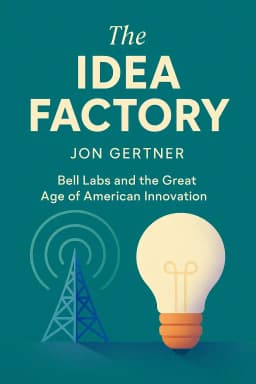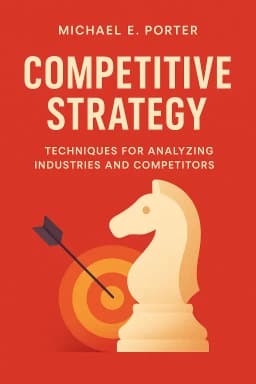
Amazon's Winning Loss
How the world’s most relentless retailer will continue to revolutionize commerce
Golden Hook & Introduction
SECTION
Joe: Most businesses that lose money for 20 years go bankrupt. One became the most powerful company on Earth. The secret wasn't genius tech or brilliant marketing. It was a willingness to fail, spectacularly, and for a very, very long time. That's the Amazon paradox. Lewis: That sounds completely insane. It's like saying the best way to win a marathon is to start by running in the opposite direction. How does that even work? It feels like a recipe for disaster, not global dominance. Joe: Exactly. And that's the puzzle at the heart of the book we're diving into today: Amazon: How the World's Most Relentless Retailer Will Continue to Revolutionize Commerce by Natalie Berg and Miya Knights. Lewis: Okay, so what’s their take? Are they just fans, or do they have a real explanation for this madness? Joe: They have a real explanation. And these aren't just any authors, Lewis. They're both top-tier retail analysts. They've spent their careers advising major brands on how to survive in this new world, so they have a real insider's perspective on what makes Amazon tick. Their whole point is that to understand Amazon, you have to throw out the old business rulebook. Lewis: I'm ready to throw it out. Where do we start? Joe: We start with the most fundamental rule Amazon broke. The one that made Wall Street tear its hair out for years.
The Amazon Paradox: Why Losing Money Was the Winning Strategy
SECTION
Lewis: Let me guess: the rule that a company is supposed to, you know, make money? Joe: Precisely. For the better part of two decades, Amazon didn't. Not really. During the dot-com boom of the late 90s, everyone was obsessed with quick profits and soaring stock prices. But Jeff Bezos had a completely different philosophy. You've probably heard his famous line: "Your margin is my opportunity." Lewis: I have, but I always thought it was just a clever, aggressive slogan. What does it actually mean in practice? Joe: It means that while every other retailer was trying to figure out how to squeeze a few extra percentage points of profit out of each sale, Bezos saw that profit margin as a weakness. He saw it as a pool of money he could give back to the customer in the form of lower prices, free shipping, and a better experience. Lewis: Hold on. That sounds great for me as a customer, but how is that a sustainable business? Why would any investor on the planet sign up to fund a company that's actively trying not to make a profit? Joe: Because Bezos was playing a much, much longer game. He wasn't building a store; he was building an infrastructure. He convinced investors that every dollar they gave him wouldn't be booked as profit. Instead, it would be poured back into building a massive, unassailable fortress of warehouses, logistics networks, and technology. He was building what he called the "flywheel." Lewis: Okay, "flywheel" is one of those business buzzwords I hear all the time. Break it down for me like I'm five. Joe: It's actually a beautifully simple idea. It starts with the customer experience. If you offer the lowest prices and the best selection, you get more customers. More customers attract more third-party sellers to your platform who want to reach that audience. Lewis: Right, like all those weird little brands you see on Amazon now. Joe: Exactly. That greater selection makes the platform even more valuable for customers. It also allows Amazon to build out its fulfillment network and lower its cost structure. Lower costs mean they can lower prices even further. And that brings in even more customers. Each part of the cycle pushes the next, making the flywheel spin faster and faster on its own. But here's the key: it requires immense, upfront investment. You have to build the whole machine before it starts spinning. Lewis: So he was basically telling investors, "Forget about dividends for the next decade. We're building the Death Star, and it's going to be expensive, but once it's operational, we'll rule the galaxy." Joe: That's a perfect analogy. And it also explains their attitude towards failure. They weren't just willing to fail; they built it into the business model. The most famous example is the Fire Phone. Lewis: Oh man, I remember that. It was supposed to be the iPhone killer, right? With that weird 3D screen? Joe: That's the one. They launched it in 2014 after years of development. It was a colossal flop. The company ended up taking a $170 million write-down on unsold inventory. For most companies, that would be a fireable offense for the entire executive team. Lewis: A $170 million bonfire. Wow. Joe: But Amazon's perspective was completely different. They saw that $170 million as the tuition fee they paid to learn how to build complex hardware and work with mobile carriers. The engineers and lessons from the Fire Phone failure were directly funneled into their next projects: the Amazon Echo and Alexa. Lewis: So the failure of the phone directly led to the success of the smart speaker that now lives in millions of homes. Joe: Without a doubt. That's the paradox in action. They're willing to lose hundreds of millions on one bet because they know that the one-in-ten bet that succeeds will be so massive it'll pay for all the failures and then some. It’s a mindset that traditional, profit-focused retailers simply can't compete with.
The Ecosystem Trap: Redefining Loyalty Beyond a Simple Purchase
SECTION
Lewis: Okay, I think I get it. They built this massive, unstoppable machine by ignoring profits and embracing failure. But how do they keep people locked into that machine? I can still go to Target or my local bookstore. What's the glue that holds it all together? Joe: Ah, that brings us to the second, and arguably more revolutionary, idea from the book. Amazon realized that the ultimate competitive advantage wasn't just low prices. It was creating an ecosystem so convenient and so valuable that leaving it would feel like a genuine downgrade to your lifestyle. And the gateway to that ecosystem is Amazon Prime. Lewis: Right, Prime. Free two-day shipping. Joe: That's how it started in 2005. And at the time, even that was a radical idea. People inside Amazon were terrified it would cannibalize their shipping revenue. But Bezos pushed it through because he understood something profound about human psychology. Lewis: What's that? Joe: Once you pay an annual fee for a service, you feel a psychological need to get your money's worth. Prime members don't just shop more; they start their search on Amazon by default. Why would you even bother looking elsewhere when you've already paid for the "free" shipping? Lewis: It's like an all-you-can-eat buffet. You're going to eat until you feel you've justified the entry price. Joe: A perfect comparison. But then Amazon started adding more and more to the buffet. First, it was streaming video. Then music. Then e-books, photo storage, exclusive deals. Prime evolved from a simple shipping program into a full-blown digital membership. It's not a loyalty program; it's a lifestyle subscription. Lewis: It’s a gilded cage. A very, very convenient cage with free movies. Joe: Exactly. And just when everyone thought Amazon had perfected the digital cage, they did something that shocked the entire industry. They bought a grocery store chain. Lewis: The Whole Foods acquisition. I remember the day that was announced. It felt like it came out of nowhere. Why would a digital giant spend over $13 billion on brick-and-mortar stores? Joe: Because they understood that the future of retail wasn't online or offline. It was both. As the authors Berg and Knights point out, the lines are blurring completely. Groceries are a key battleground because it's a high-frequency purchase. Most people don't buy a new TV every week, but they do buy milk and eggs. Lewis: So getting into your grocery basket means they get into your weekly routine. Joe: Precisely. The Whole Foods acquisition gave them hundreds of physical locations overnight. These weren't just stores; they became distribution hubs for online orders, return centers for Amazon.com packages, and a physical billboard for the Amazon brand. They immediately integrated Prime, offering special discounts for members. Lewis: So the digital ecosystem suddenly bled into the physical world. Your Prime membership now saved you money at the checkout counter. Joe: And that's the masterstroke. It reinforces the value of the entire ecosystem. Your Prime membership, your Alexa smart speaker that adds items to your shopping list, your Amazon credit card that gives you cash back at Whole Foods—it all works together. Each piece makes the others more valuable and makes you, the customer, more dependent on the whole system. This is what the book calls the rise of the "on-my-terms" shopper. We now expect everything to be seamless, fast, and integrated, because Amazon taught us to. Lewis: That’s the "Amazon Effect" people talk about, right? It’s not just that Amazon is successful, it’s that their success has permanently rewired our expectations for every other business on the planet. Joe: That's it. They've created a new baseline for convenience. And any retailer who can't meet that baseline is now seen as deficient. They didn't just build a better store; they terraformed the entire retail landscape to fit their own DNA.
Synthesis & Takeaways
SECTION
Lewis: Wow. So when you put it all together—the long-term vision, the embrace of failure, the ecosystem trap—what's the big, final takeaway? Is Amazon just this unstoppable corporate monster that's going to swallow everything? Joe: The authors argue it's more nuanced than that. It's not about being a monster, but about being a different species of company. Traditional retailers were built for an era of physical stores, limited shelf space, and friction in the buying process. Amazon was designed from day one for a world of infinite choice and digital convenience. Lewis: They were native to an environment that the old guard had to painfully adapt to. Joe: Exactly. They didn't just change the game; they created an entirely new one. And in this new game, the ultimate goal isn't just to sell you something once. The goal is to become the underlying utility for your entire commercial life—your shopping, your entertainment, your groceries, your cloud computing. Lewis: That's a chilling and brilliant thought. It really reframes the whole relationship. Joe: It does. And it leaves us with a pretty profound question, which the book forces you to confront: are we simply customers of Amazon, or have we become subscribers to the Amazon way of life? And at this point, is there even a difference anymore? Lewis: That is a heavy thought to end on. It makes me look at my Prime account a little differently. We'd love to hear what you all think. Are you all-in on the Amazon ecosystem, or do you actively try to resist it? Let us know what your experience is. Joe: This is Aibrary, signing off.
